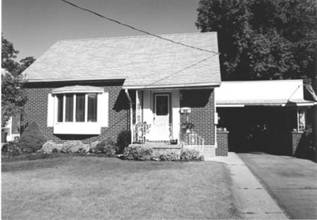|
|
by Rick Baker
On Oct 7, 2011
Douglas Porter, BMO’s Deputy Chief Economist and Managing Director, helped CFFB kick of its 2011/2012 year.
Douglas was the keynote speaker at our September AGM and Program Launch.
To get a feel for the audience, the full crowd of family business people and their allies and friends, Douglas asked how people feel about the future.
He asked: “Do you feel Optimistic, Cautious, or Pessimistic about business?”
While we didn’t record an exact score, here is how the audience responded:
| Optimistic about the future: |
about 50% |
| Cautious about the future: |
about 50% |
| Pessimistic about the future: |
2 or 3% |
Douglas said our level of Optimism is about double the national average.
Then he said something like, “that makes sense…you are family businesses”.
I talked with people after the presentation. I asked how they felt about that comment…and family-business people felt good about the comment. I suppose family business people see themselves as being a bit different than other business people. And, if part of that difference is ‘being more optimistic’ then that’s a good thing.
Douglas provided some positive economic indicators:
- Oil price relief
- Interest rate relief
- Japan’s recovery
- U.S. households in better shape
- Corporate finances strong
- More Canadians working now than ever before
- Home prices are increasing and home sales are holding
- Canada has a triple-A credit rating
Sure, there are some negatives too. But, with these sorts of positive things it is understandable that half of family businesses are feeling more optimistic than cautious.
Thank you, Douglas for doing such a good job of delivering a very well-prepared package of economic information to our CFFB members, sponsors, advisors, and friends. You helped our 2011/2012 year get off to a great start!
by Rick Baker
On Jul 14, 2011
Father-to-Son Business Lesson #28
From the 2005/2006 series of Father-to-Son Business Lessons…
A little advice on people, failing, succeeding…and not giving up.
***
As you ‘get it’...I hope you enjoy ‘getting it’.
These things I am suggesting may not work for you. On the other hand, these ways have worked for me.
Certainly, I’ve had my share of failures. Actually, I’ve had way more than my share. But, that’s not a problem. Business life is about a long string of successes and failures. Probably, for everyone - many more failures than successes. That isn’t important enough to waste more time on.
What is important is: and important in this sequence, as Business Lesson #28: what do you think is going to happen next?...and, what are you doing to make it happen?
When I look to the future, I think of the amazing things that can happen. Sure there’s a maze ahead. What do I do about it: well, in my own way, I try to make things happen.
Sometimes easy things.
Sometimes tough things.
Whatever seems the best approach at the time.
I do think it is important to be positive.
But to me, of more importance, we must be realistic.
If it ain’t broken...win with it. If it is broken...then at least recognize that and learn from that as you lose the game (but not the series).
Make changes in an effort to learn: about yourself, about other people, and about business.
As Einstein more-or-less said: “If you keep doing the same things and you expect different results then you are a fool.”
As you father says, “Many times you better change direction when you hit the wall of the business maze....on other occasions you must keep the course and gnaw your way through the underbrush.”
And, “There are reasons why, of all the animals, they put rats in mazes. Rats are smart, they are curious, and they have sharp teeth capable of gnawing through almost anything. Rats see no faze in the maze.”
by Rick Baker
On May 11, 2011
|
David Wood spoke at CFFB’s April 29th breakfast…telling his family’s 3-generation business story and providing education and recommendations about strategic planning. David’s stories contained and excellent mix of family pride, family respect, and business savvy…particularly, the ability to make major changes when major changes had to be made.
|
 |
David first talked about his grandfather Wilbert Copeland (Bert) Wood, who, after losing his job in 1930 founded the family business - W.C. Wood Company. The Wood family business started as a machining operation in the back of a candy shop in Toronto.
As David told this story, I thought of my father and his stories of men knocking on our family’s front door in the 1930’s…asking if they could work for food. And, my Dad also told stories of his group of buddies fishing in the Thames River and giving fish to the transient men who camped there while they tried to find work.
“The Depression” – what a difficult time that must have been…imagine 30% unemployment…imagine losing your job while trying to feed your family…imagine being a child trying to understand it all.
Yet – even the darkest clouds can have silver linings!
David’s grandfather W.C. (Bert) Wood found such a silver lining. He must have been quite a fellow…founding a very successful family business while other men knocked on doors to work for food and other men camped in groups by the rivers…cooking fish over open fires.
David described his grandfather as a “fabulous engineer”. I could picture him machining parts in the back of the candy shop, designing and building electrical farm equipment. The business community would have been in disarray…money tight, some folks shell-shocked, morale low…spirits tested to the limit. Somehow, no doubt largely due to an unfailing commitment to succeed, Bert Wood created a family business during those difficult Depression years. And, in 1938, he built the W.C. Wood Company’s first freezer.
David explained the highlights of W.C. Wood Company history.
David’s father John F. Wood joined the company in 1964. John graduated from the University of Western Ontario’s Business School…now the Ivey School of Business, where David teaches. By the mid-1960’s W. C. Wood Company manufactured a range of products: David mentioned farm equipment, home appliances, military equipment, hardware, water heaters, and aircraft equipment…including landing gear parts for Avro Aircraft Limited. John Wood brought a new level of business savvy to the family business. John took over leadership of the family business in the mid-1970’s.
John Wood retired in 2005. That’s when David took over leadership of his family’s business. It was clear major changes were required. He refocused on growth of core-business profits. The company right-sized and returned to profitable operations by 2007. David made the decision to sell W.C. Wood Company. Whirlpool owns the company now. David stayed to help transition the business until 2008. And, still involved in family business, David serves on the boards for Danby Products Ltd and Westminster Woods.
David is a full-time lecturer in operations management at the Ivey School of Business. Ivey summarizes Operations Management as “a discipline about managing productivity, inventory, quality, and other processes related to making products or providing services”. In addition, David provides business consulting services.
So, at our CFFB event, it was easy for David to move from providing a history of his family’s business to providing education and recommendations about strategic planning. David started by sharing a startling pair of facts:
- 10% of family businesses have a strategic plan
- 53% of companies have a strategic plan
That signals an area where family businesses can and should improve.
“Strategic planning is important because it realigns management’s direction towards a common goal.”
David helped CFFB members understand another important point…
“Strategic Planning offers an opportunity to develop the next generation.”
David asked - if strategic planning provides such value then why don’t business people do it?
David provided what he believes to be the top reasons business people fail to do strategic planning:
- Lack of time…people say they don’t have time to plan
- The planning process is frustrating…business people know the day-to-day work and they feel comfortable doing the day-to-day work whereas people do not feel as comfortable working on long-term decisions
For governance and planning at family businesses, David described 3 important considerations…3 partsof business:
- Ownership
- Family
- Business Managers
He recommended family business people discuss at least these 3 parts of their business at least once a year. He also recommended we separate these 3 parts and consider them individually.
To help start the process, David provided his definition of strategic planning.
Strategic Planning def’n:
What you DO to create a sustainable competitive advantage.
(and…what you DO NOT DO)
[If you are like me then you keep your eyes open for straightforward business definitions…and you will remember this one David provided.]
Strategic Planning is what we family business people must do to create a sustainable competitive advantage. As David noted, things change rapidly in business.
The value doesn’t rest in the pieces of paper created under strategic planning.
The process of planning is where family business people will obtain the most value. The value is in the sharing of thoughts and ideas.
Quoting David Wood:
“the document is the by-product”
“companies that engage in the process have higher success rates”
David provided a summary of the MBA strategic planning process, he talked of the importance of the implementation work, and he answered questions for our members.
Thank you, David, for sharing your family story and your strategic planning recommendations.
by Rick Baker
On Mar 17, 2011
“Resolving Disputes in Business and in Life”
That is the title of the presentation Mark Weber gave at our last Centre For Family Business breakfast.
As always, Mark provided a fun, educational session.
I took lots of notes and this Thought Post outlines a couple of my take-aways…which I have already used to help myself and other folks with decisions.
1st take-away: When resolving a dispute, first focus on Interests
There are three approaches to resolving disputes: the Interest approach, the rights approach, and the Power approach. Mark pictured it this way:
Interests are our needs, desires, concerns…that’s the best place to resolve disputes. When we escalate discussion from Interests to Rights we get into negative emotional territory. An example of Rights would be, ‘the contract says _______’. Beyond discussion of Rights, disputes could escalate into Power territory. An example would be, ‘setting an ultimatum’.
When facing a dispute, first, take time to focus on Interests.
2nd take-away: People are biased and make a fundamental attribution error
While Mark was talking, I drew a little table to capture another lesson.
|
|
When it is me
|
When it is someone else
|
|
When things go well
|
I give the credit to myself
|
I give the credit to the situation
|
|
When things go poorly
|
I blame the situation
|
I blame the person
|
I don’t believe this is intended to apply to all the people all the time. Rather, it is a tendency we should consider as we judge other people…and, as we try to understand how other people judge us.
In summary, when the biasis at work we judge like this:
- When other people do poorly we blame their behaviour [ie, we blame them]. However, when other people do well we give credit to the situation.
- We do the exact opposite when it comes to judging ourselves.
Thank you, Mark, for presenting very helpful advice on this thought-provoking topic…a topic that, as your presentation title says, applies both to Business and to Life.
***
A personal story – about Bias
Clearly, to the extent bias exists in us we should work to find at least middle ground.
As an example - Performance Appraisals are not a dispute per se…but they can quickly and even quietly become disputes.
Many years ago I recognized I tended to judge people too harshly when I gave performance reviews. My view at the time was - people judged themselves too leniently. I came to these conclusions because I asked people to write their own self-assessments and provide them to me before I presented the performance review I had written about them. When I received their self-reviews and compared them to my boss-created-reviews I noticed a consistent, big gap. I gave this quite a bit of thought. I tried to put myself in the other peoples’ shoes so I might understand how they reached their self-review scores. Then I thought about why the gaps in our views were so large. I concluded I set very high standards on myself and those standards could not, in general, be applied to others. [Perhaps that conclusion was wrong…I hope to discuss this with Mark Weber.] I decided to refrain from reviewing people’s self-assessments until I had completed a first draft myself. Then, I took my first draft and before looking at the self-assessments I raised every grade…about 20 points out of 100. That removed the gap for some people, removed more than half the gap for most people…however, a too-big gap still existed for some people.
That was many years ago. I now understand situations are a vital consideration. I now know under the same situation some people succeed while other people fail. I know leaders and co-workers must do their best to construct ‘winning’ situations. And, we must do what we can to help one another be better prepared for the ‘challenging’ situations.
More on this topic in future Thought Posts…
by Rick Baker
On Feb 24, 2011
Two separate paths came together.
One path started at a farm near the Pioneer Tower, by our Grand River.
The other path started in England…then crossed the ocean to end up at our Cambridge.
The two paths came together in 1970 when the country fellow, Gary, met the city girl, Marie.
That is a very quick summary of how the second generation of the Pioneer Craftsmen family business came about. Gary Adam’s father, Ken Adam, started the company in 1953 when he transitioned from farming to building and home renovations.
In 1972 Marie and Gary married and they had two sons, Jamie and Jeff. Jamie chose to work at the family business. Jeff is a teacher in Kitchener.
Since the 1970’s Gary and Marie have worked together, building the family business. Their grounding forces were hard work, care for clients, and an ability to read the market.
That’s the solid ground Pioneer Craftsmen has been built on for over 30 years.
Marie summed it up this way, “If you don’t treat your clients well and give them more than they expect then you are not going to be successful in business”.
That way of thinking existed from the start, when Ken Adam created the business. Ken is fondly remembered as a man who was “light on talk and heavy on walk”. Ken was a family-business role model for Gary and Marie and also their son Jamie who became President of the family business in 2009.
Marie and Gary are a close couple: they credit one another for providing long-term support…good sounding boards for one another…and helping one another see the big picture. And, it’s also important to have fun…that’s key to survival.
That’s strong fabric for a family business!
Gary and Marie Adam
Sharing fond memories…
When asked about fond memories, Marie smiled and told the story of her teenage son, Jamie, making his way to and from job sites on his bicycle during the summer. This started in 1988 when Jamie was 14 years old. “It was expected he find his way. He never asked for a ride”.
Then, another broad smile as Mom admitted – “I did drive him once in a while when it was pouring rain”.
Jamie, the 3rd generation Pioneer Craftsmen Adam, studied and worked through the roles of labourer, office, sales, and General Manager before earning the role of President.
A long-time employee, Paul Meier, also worked his way up from on site roles to Sales Manager. Paul is now part owner of the company.
Paul and Jamie will be the guiding forces as Pioneer Craftsmen steps toward its exciting future.
Jamie Adam & Paul Meier
“Poised to take Pioneer Craftsmen to the next level!”
Marie’s story continued…
“Our son…watching the progression from bicycles and summer jobs to earning the job of company President…that’s our proudest family-business memory”.
***
Pioneer Craftsmen works out of its new home at 1510 Victoria Street North, Kitchener.
The Pioneer Craftsmen team, at their new Kitchener work place.
Pioneer Craftsmen is proud of the strong client relationships it has built.
Here is a sample to explain what that means: in the early 1980`s Pioneer Craftsmen did a project for a client in Guelph. During a recent visit this client mentioned to Gary that Pioneer Craftsmen became part of the family during that renovation. That’s why they have chosen Pioneer Craftsmen to do all renovation work over a period of almost 30 years and 22 projects.
When clients consider you part of their family…that’s business excellence!
And that is one of the stories Jamie, Paul, Gary, and Marie use to help their team understand their company’s client relationship goals.
A couple of samples of the impressive work Pioneer Craftsmen is doing at our community:
 |
 |
| Before Pioneer Craftsmen magic |
After Pioneer Craftsmen magic |
 |
 |
| Before Pioneer Craftsmen magic |
After Pioneer Craftsmen magic |
Awesome work!
Family: that’s the starting point for a family business.
And, it is the ending point for this Family Business Success Story.
Marie and Gary Adam enjoy 4 grandchildren: Marcus, Johnathan, Maddy, and Kaylee.
Here’s a picture of Marie & Gary, their sons Jamie & Jeff and their sons` families…having fun!
Congratulations to a fine local family and a fine local family business!
by Rick Baker
On Feb 17, 2011
‘Business Cards to Business Relationships’
Allison Graham gave an excellent presentation of her ‘business relationship’ ideas at our January CFFB breakfast…lots of buzz during and after the event.
While everyone knows relationships are an essential part of business success, few people provide straight-up advice on how to go about building better relationships with other business people.
Allison Graham is exceptional. Allison provides straight-up advice…both in person, as she did at CFFB last month, and in her book ‘BUSINESS CARDS to BUSINESS RELATIONSHIPS, How to Build the Ultimate Network’.
Here are some examples of Allison’s views and recommendations:
- Networking is connecting with others and letting others connect with you
- Networking can be taught and learned
- Put some strategy into your networking
- Make eye contact when you shake hands
- Your business card is still a great marketing tool
- Print out your database, read through it, figure out the top 20 people you should get to know this year and the top 20 events you should attend this year
- If you are over 50 then mentor younger folks…help them understand how to give
As you can see from the above samples, Allison provides definitions, covers the thinking behind building relationships, and recommends specific actions you can use to build your ultimate network. That’s a full package of help.
Yes – those were just a few samples of how Allison goes about helping people network.
To learn much more, you should buy a copy of Allison’s book ‘BUSINESS CARDS to BUSINESS RELATIONSHIPS, How to Build the Ultimate Network’.
Thank you for sharing your expertise at our January CFFB event, Allison.
PS: We like Allison’s book so much we bought more copies to give to our clients. Allison took the time to sign these copies. We would be honoured to give one of our author-signed copies to the first CFFB member who sends an email to us, requesting a copy of ‘BUSINESS CARDS TO BUSINESS RELATIONSHIPS’.
|
|